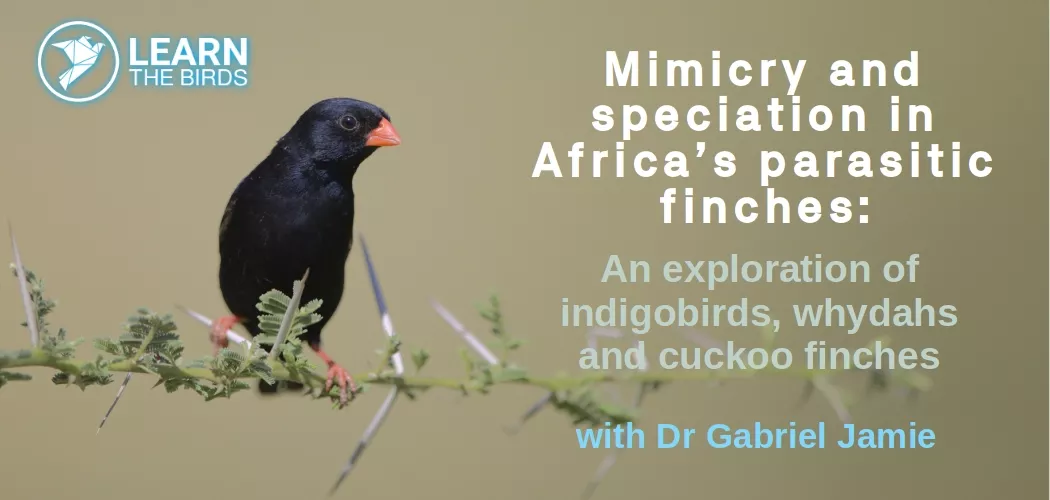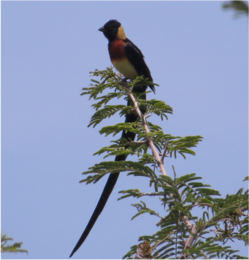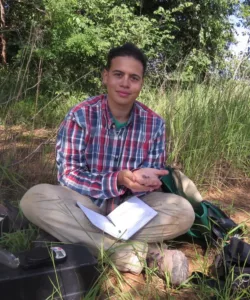
Mimicry and speciation in Africa’s parasitic finches: an exploration of indigobirds, whydahs and cuckoo finches
Africa is the continent with the greatest diversity of brood-parasitic birds on Earth. Brood parasites are species that forego their parental duties. Instead lay their eggs in the nests of other birds and force them to rear their young.
One of the most fascinating and species rich group of brood parasites in Africa are the parasitic finches. These consist of the whydahs, indigobirds and cuckoo finch. The indigobirds and whydahs (collectively known as Vidua finches) are remarkable in being extremely specialised brood parasites on hosts in the family Estrildidae (waxbills, firefinches, pytilias and twinspots).
Dr Gabriel Jamie, a research scientist at University of Cambridge and Fitzpatrick Institute of African Ornithology, has been studying Vidua finches for much of the past decade. In this talk, he will explore the intricate and highly specialised mimicry that nestling Vidua finches have evolved to deceive their foster parents and coerce them into providing food to an offspring that is not its own.
Gabriel will also discuss the amazing capacity Vidua have to imprint on their host’s vocalisations. When the males mature and start to display they imitate elements of their host’s vocalisations into their own repertoires. Therefore, male Vidua broadcast the identity of the host they were raised by to both female Vidua and to birders! This presents a unique opportunity amongst brood parasitic birds where patterns of host-use can be ascertained with relatively little effort – only sound recording rather than DNA analysis or nest finding is required.
Finally, Gabriel will explain the implications that host imprinting has for the origin of new Vidua species. Namely, that if a female Vidua accidentally lays in the nest of the new host she has the potential to initiate a new lineage of Vidua intimately connected to the new host species and reproductively isolated from other Vidua lineages. This can generate rapid speciation over the course of a single generation. Gabriel will explore this process in detail and highlight the amazing opportunities Vidua provide to study the process of speciation in action.
Additional Details
Webinar link - https://zoom.us/j/91002586133?pwd=ZFhSaWJtcUlLMzR5V1pXeXYrUjNvQT09
Meeting ID - 910 0258 6133
Passcode - 713107
Check my time zone - https://www.starts-at.com/e/?t=1900&d=2021-05-20&tz=Africa/Johannesburg
Event platform - zoom
Interaction
Interactivity is everything! Please gear up to ask question and our speaker will do their best to answer them live. Place your questions in the chat during the event, so that the moderator can pick them up to ensure that they get answered.

 Gabriel Jamie became interested in science as a child through watching birds, first in Cape Town and then in the United Kingdom. This has resulted in a life-long avian obsession that has led him to fieldwork on birds in many places around the world. As a teenager he worked on projects studying migratory birds in the Danube Delta of Romania and on Antikythira in Greece. While doing an undergraduate degree in Natural Sciences at the University of Cambridge, Gabriel spent summers working as a research assistant studying bird communities in Peru with scientists from Oxford University and Conservation International. After graduating, Gabriel went on to do a PhD with Prof. Claire Spottiswoode at University of Cambridge conducting fieldwork in Zambia to study mimicry and speciation in the brood-parasitic Vidua finches (indigobirds and whydahs). Gabriel is currently a Leverhulme Research Fellow at the University of Cambridge where he continues to study brood-parasitic birds in Africa. Gabriel’s current work focuses on the interactions between the brood-parasitic Cuckoo Finch (Anomalospiza imberbis) and its Tawny-flanked Prinia (Prinia subflava) hosts. Prinias have evolved incredibly diverse eggs which vary dramatically in colour and pattern between individuals. Gabriel is currently investigating the genetic basis of this diversity and the consequences of this genetic architecture for the co-evolutionary trajectories in the ongoing arms race between prinias and their Cuckoo Finch parasites. Gabriel is involved in ornithological expeditionary work and the conservation of African birds and is a Research Associate at the FitzPatrick Institute of African Ornithology at the University of Cape Town. In November 2016, Gabriel was part of an expedition to the Njesi Plateau in northern Mozambique with researchers from BINCO. Together with Sam Jones, they discovered new populations of the highly endangered Mozambican Tailorbird (Artisornis sousae) and Dapplethroat (Modulatrix orostruthus) as well as finding two species previously unrecorded from Mozambique.
Gabriel Jamie became interested in science as a child through watching birds, first in Cape Town and then in the United Kingdom. This has resulted in a life-long avian obsession that has led him to fieldwork on birds in many places around the world. As a teenager he worked on projects studying migratory birds in the Danube Delta of Romania and on Antikythira in Greece. While doing an undergraduate degree in Natural Sciences at the University of Cambridge, Gabriel spent summers working as a research assistant studying bird communities in Peru with scientists from Oxford University and Conservation International. After graduating, Gabriel went on to do a PhD with Prof. Claire Spottiswoode at University of Cambridge conducting fieldwork in Zambia to study mimicry and speciation in the brood-parasitic Vidua finches (indigobirds and whydahs). Gabriel is currently a Leverhulme Research Fellow at the University of Cambridge where he continues to study brood-parasitic birds in Africa. Gabriel’s current work focuses on the interactions between the brood-parasitic Cuckoo Finch (Anomalospiza imberbis) and its Tawny-flanked Prinia (Prinia subflava) hosts. Prinias have evolved incredibly diverse eggs which vary dramatically in colour and pattern between individuals. Gabriel is currently investigating the genetic basis of this diversity and the consequences of this genetic architecture for the co-evolutionary trajectories in the ongoing arms race between prinias and their Cuckoo Finch parasites. Gabriel is involved in ornithological expeditionary work and the conservation of African birds and is a Research Associate at the FitzPatrick Institute of African Ornithology at the University of Cape Town. In November 2016, Gabriel was part of an expedition to the Njesi Plateau in northern Mozambique with researchers from BINCO. Together with Sam Jones, they discovered new populations of the highly endangered Mozambican Tailorbird (Artisornis sousae) and Dapplethroat (Modulatrix orostruthus) as well as finding two species previously unrecorded from Mozambique.